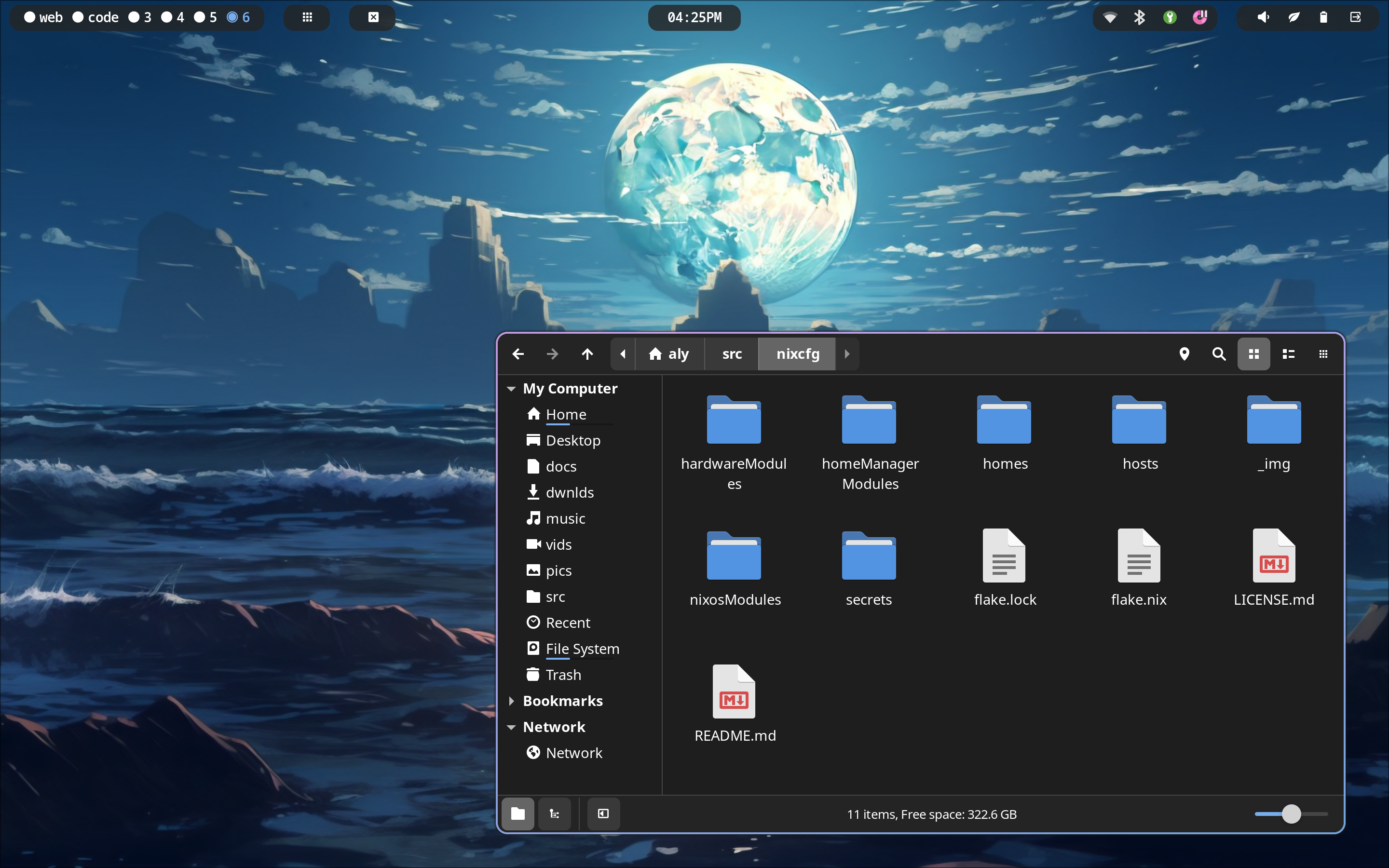* mauville: move to disko with btrfs on /dev/nvme0n1 * mauville: add media and archive disks with btrfs * mauville: run ssh in initrd to type luks password mauville: force system.autoUpgrade.allowReboot to false mauville: bump stateVersion no public secrets, autogen initrd ssh on activation |
||
|---|---|---|
| .github/workflows | ||
| _img | ||
| baseModules | ||
| flake | ||
| homeManagerModules | ||
| homes | ||
| hosts | ||
| nixosModules | ||
| secrets | ||
| userModules | ||
| .gitignore | ||
| .gitlab-ci.yml | ||
| flake.lock | ||
| flake.nix | ||
| LICENSE.md | ||
| README.md | ||
nixcfg
NixOS flake for all mine + my family's hosts, including modules for Hyprland, Sway, GNOME, and more.
Inputs
This flake takes a variety of inputs, first and foremost my other flakes:
- nixhw: opinionated set of generic (AMD, Intel, Laptop, SSD) and specific (Framework 13, Yoga 9i, Thinkpad T440p) hardware configuration modules for NixOS.
- raffauflabs: everything (containers, services, nginx, etc) that makes my home lab a home lab.
As well as upstream third-party projects that I use for various tasks:
- agenix: secrets storage and orchestration.
- disko: declarative partitions and disk configuration.
- home-manager: declarative dotfile and user package management.
- hyprland: great dynamic tiling wayland compositor.
- iio-hyprland: autorotate daemon for Hyprland.
- nixvim: helpful neovim modules.
- nur: extra packages from the nix user repository.
Outputs
- homeManagerModules.default: app modules + everything you need for a competent Hyprland desktop (and a few others).
- nixosModules.base: opinionated basic system configuration.
- nixosModules.nixos: opinionated desktop, app, and service modules.
- nixosModules.users: basic user configuration for three users.
In addition, this flake outputs NixOS configuration and home-manager configurations for all of my hosts and users, respectively.
Rice
Deploying to NixOS
🔴 Do not deploy this flake unmodified to your machine. It won't work. This is my own NixOS and home-manager flake for my personal devices. Each hardware configuration is host-specific. If you fork this repository, add a host configuration for your own hardware. Secrets are encrypted with agenix and will not be available without the private decryption keys.
Enabling Flakes
While widely used and considered stable, flakes are still considered experimental. To enable Flakes, add the following lines to your configuration.nix and rebuild.
nix.settings.experimental-features = [ "nix-command" "flakes" ];
Alternatively, pass --experimental-features "nix-command flakes" to nix to temporarily use flakes.
Building Flake
In order to deploy this Flake on your host, run the following command:
sudo nixos-rebuild boot --flake github:alyraffauf/nixcfg#$HOSTNAME
Substitute $HOSTNAME for whichever hostname you have chosen. Reboot to apply the flake's configuration for the chosen host.
Installing from Live USB
🔴 This will erase your computer's disk as specified by the host configuration, installing a fresh copy of NixOS. Backup first!
If you want to install NixOS from this flake, run the following commands, ideally from a NixOS live environment, substituting $HOSTNAME with a NixOS configuration specified in flake.nix.
sudo nix --experimental-features "nix-command flakes" run github:alyraffauf/nixcfg -- $HOSTNAME
